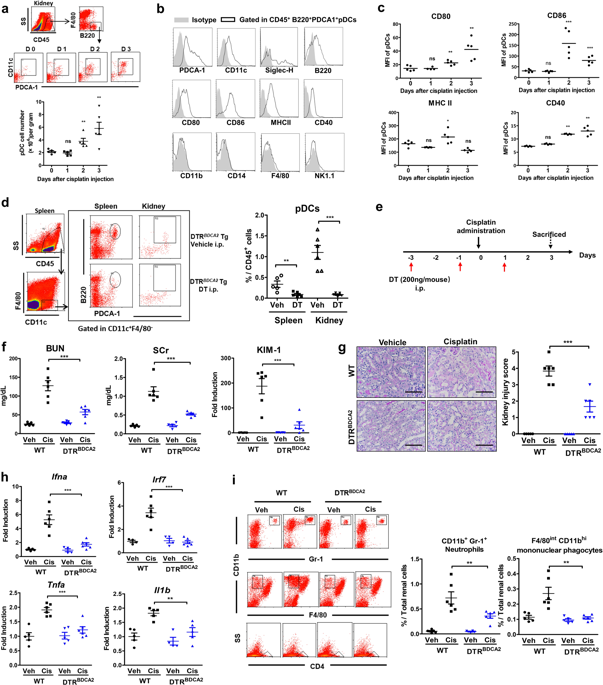Cellular & Molecular Immunology ( IF 21.8 ) Pub Date : 2020-01-03 , DOI: 10.1038/s41423-019-0343-9 Bo Deng 1 , Yuli Lin 2, 3 , Yusheng Chen 4 , Shuai Ma 1 , Qian Cai 2 , Wenji Wang 1 , Bingji Li 2 , Tingyan Liu 1 , Peihui Zhou 1 , Rui He 2 , Feng Ding 1

|
Acute kidney injury (AKI) is a common clinical complication associated with high mortality in patients. Immune cells and cytokines have recently been described to play essential roles in AKI pathogenesis. Plasmacytoid dendritic cells (pDCs) are a unique DC subset that specializes in type I interferon (IFN) production. Here, we showed that pDCs rapidly infiltrated the kidney in response to AKI and contributed to kidney damage by producing IFN-α. Deletion of pDCs using DTRBDCA2 transgenic (Tg) mice suppressed cisplatin-induced AKI, accompanied by marked reductions in proinflammatory cytokine production, immune cell infiltration and apoptosis in the kidney. In contrast, adoptive transfer of pDCs during AKI exacerbated kidney damage. We further identified IFN-α as the key factor that mediated the functions of pDCs during AKI, as IFN-α neutralization significantly attenuated kidney injury. Furthermore, IFN-α produced by pDCs directly induced the apoptosis of renal tubular epithelial cells (TECs) in vitro. In addition, our data demonstrated that apoptotic TECs induced the activation of pDCs, which was inhibited in the presence of an apoptosis inhibitor. Furthermore, similar deleterious effects of pDCs were observed in an ischemia reperfusion (IR)-induced AKI model. Clinically, increased expression of IFN-α in kidney biopsies was observed in kidney transplants with AKI. Taken together, the results of our study reveal that pDCs play a detrimental role in AKI via IFN-α.
中文翻译:

浆细胞样树突状细胞通过产生干扰素-α促进急性肾损伤
急性肾损伤(AKI)是一种常见的临床并发症,与患者的高死亡率相关。最近描述了免疫细胞和细胞因子在 AKI 发病机制中起重要作用。浆细胞样树突状细胞 (pDC) 是一种独特的 DC 亚群,专门从事 I 型干扰素 (IFN) 的生产。在这里,我们发现 pDC 响应 AKI 迅速浸润肾脏,并通过产生 IFN-α 导致肾脏损伤。使用 DTR BDCA2删除 pDC转基因 (Tg) 小鼠抑制顺铂诱导的 AKI,伴随着肾中促炎细胞因子产生、免疫细胞浸润和细胞凋亡的显着减少。相反,在 AKI 期间过继转移 pDC 会加剧肾脏损伤。我们进一步确定 IFN-α 是在 AKI 期间介导 pDC 功能的关键因素,因为 IFN-α 中和显着减轻了肾损伤。此外,pDCs产生的IFN-α在体外直接诱导肾小管上皮细胞(TECs)的凋亡。此外,我们的数据表明,凋亡的 TECs 诱导了 pDCs 的激活,而 pDCs 在凋亡抑制剂的存在下受到抑制。此外,在缺血再灌注 (IR) 诱导的 AKI 模型中观察到 pDC 的类似有害作用。临床上,在患有 AKI 的肾移植中观察到肾活检中 IFN-α 的表达增加。总之,我们的研究结果表明,pDC 通过 IFN-α 在 AKI 中发挥有害作用。











































 京公网安备 11010802027423号
京公网安备 11010802027423号